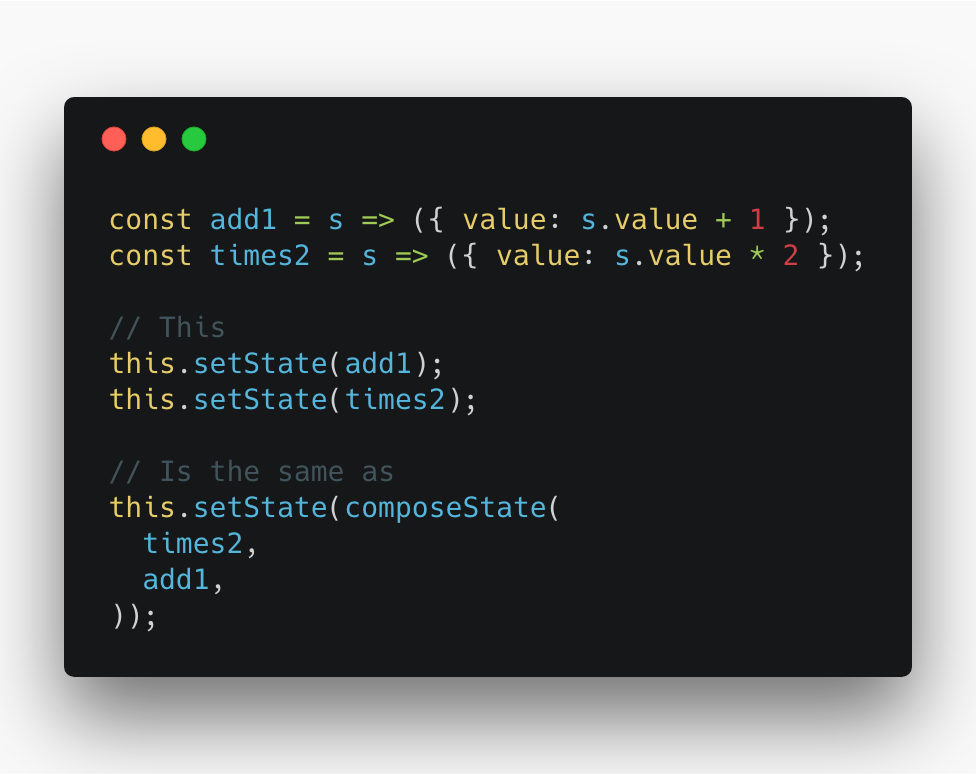https://github.com/tvler/compose-state
Compose multiple setState or getDerivedStateFromProps updaters in React
https://github.com/tvler/compose-state
functional-programming javascript react
Last synced: 10 months ago
JSON representation
Compose multiple setState or getDerivedStateFromProps updaters in React
- Host: GitHub
- URL: https://github.com/tvler/compose-state
- Owner: tvler
- License: mit
- Created: 2018-04-29T23:29:48.000Z (almost 8 years ago)
- Default Branch: master
- Last Pushed: 2023-01-06T01:50:55.000Z (about 3 years ago)
- Last Synced: 2025-03-27T00:33:50.519Z (11 months ago)
- Topics: functional-programming, javascript, react
- Language: JavaScript
- Homepage:
- Size: 1.31 MB
- Stars: 117
- Watchers: 3
- Forks: 3
- Open Issues: 13
-
Metadata Files:
- Readme: readme.md
- License: license
Awesome Lists containing this project
- awesome-react - compose-state - Compose multiple setState or getDerivedStateFromProps updaters in React
README
# ✍️ compose-state
`compose-state` is a library that composes multiple state updaters in React.

`compose-state` works with the standard `setState` parameters – objects or functions – so you don’t have to learn any new syntax. It’s also compatible with React’s new [`getDerivedStateFromProps`](https://reactjs.org/docs/react-component.html#static-getderivedstatefromprops) lifecycle method.
## Use
### Install
`yarn add compose-state` or `npm install compose-state`
### Import
```jsx
import composeState from 'compose-state';
// or
import {
composeState,
composeDerivedStateFromProps,
} from 'compose-state';
```
### API
#### `composeState([updaters])`
Returns an updater that can be used with `setState`. Calling this produces the same result as calling or accessing each given updater from right to left, merging each partial state. If a given updater is a function, its `prevState` value is the previous state merged with the current partial state.
##### Arguments
| Name | Type | Description |
| - | - | - |
| `[updaters]` | `(...Updater)` | Functions that can be used with `setState`, or partial state objects |
#### `composeDerivedStateFromProps([updaters])`
Returns an updater that can be set as a component's `getDerivedStateFromProps` static value. Calling this produces the same result as calling or accessing each given updater from right to left, merging each partial state. If a given updater is a function, its `prevState` value is the previous state merged with the current partial state.
##### Arguments
| Name | Type | Description |
| - | - | - |
| `[updaters]` | `(...Updater)` | Functions that can be set as a component's `getDerivedStateFromProps` static value, or partial state objects |
## Benefits
### Simplify your updaters and React code
Let's say you want to call `setState` and do two things
1. Increment a score value by 1
2. Log the current time to an array
Both of these updaters need to be functional, since they rely on the previous state for their return values.
```jsx
const updateScore = s => ({ score: s.score + 1 });
const logTime = s => ({ log: [...s.log, Date.now()] });
```
Normally, we would need to call `setState` for both of these functions
```jsx
class Game extends Component {
onScore = () => {
this.setState(updateScore);
this.setState(logTime);
};
// ...
}
```
...or we rewrite the two updaters into one larger function.
```jsx
const updateScoreLogTime = s => ({
score: s.score + 1,
log: [...s.log, Date.now()],
});
```
But with `compose-state`, we can keep these two updaters independent, _and_ we won't have to bulk up our component code with more `setState` calls.
```jsx
const updateScoreLogTime = composeState(updateScore, logTime);
class Game extends Component {
onScore = () => {
this.setState(updateScoreLogTime);
};
// ...
}
```
`compose-state` isn't dependent on React at all, it's just a big reducer function. This allows you to build and compose as many updaters as you want while keeping your actual component code simple and maintainable.
### Easily mix functional and object updaters
`compose-state` accepts both objects and functions, just like `setState`. This allows you to mix static and dynamic updaters without increasing the complexity of any individual parameter.
```jsx
const defaultValue = { value: 0 };
const incrementOther = s => ({ other: s.other + 1 });
this.setState(
composeState(defaultValue, incrementOther)
);
```
### Compatibility with getDerivedStateFromProps
`compose-state` comes with a `composeDerivedStateFromProps` function to use with React's new [`getDerivedStateFromProps`](https://reactjs.org/docs/react-component.html#static-getderivedstatefromprops) lifecycle method.
```jsx
const updater1 = (nextProps, prevState) => {
// ...
}
const updater2 = (nextProps, prevState) => {
// ...
}
class App extends Component {
static getDerivedStateFromProps = composeDerivedStateFromProps(
updater1, updater2
)
// ...
}
```
### It's just normal, [boring](https://twitter.com/jevakallio/status/987062864002342912) React
While more formal state managers push developers away from controlling state in React, `compose-state` simply enhances state control methods that are primitive to the platform.
`compose-state` is a lot like [Classnames](https://github.com/JedWatson/classnames). It's a helper function that makes `setState` calls more declarative and easier to construct, just like how Classnames is a helper function that makes `className` values more declarative and easier to construct.
## Further reading
[Functional setState is the future of React](https://medium.freecodecamp.org/functional-setstate-is-the-future-of-react-374f30401b6b) by [Justice Mba](https://twitter.com/Daajust)
[Best kept React secret: you can declare state changes separately from the component classes.](https://twitter.com/dan_abramov/status/824308413559668744) by [Dan Abramov](https://twitter.com/dan_abramov)